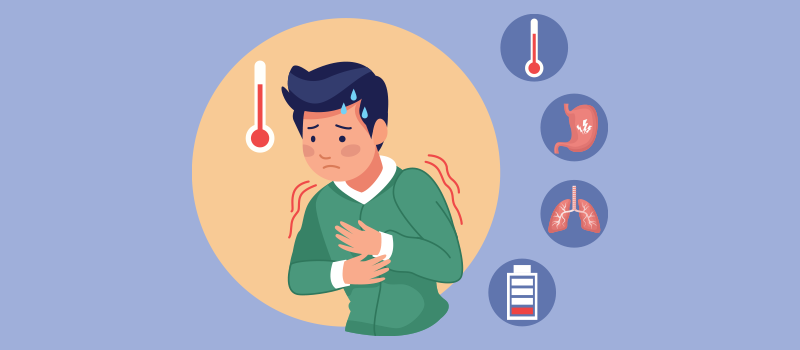What’s the Buzz
The Bee Healthy Blog
When to Go to the ER vs. Urgent Care

An illness or injury doesn’t come with an appointment. It can strike out of the blue. You could wake up in the middle of the night with nausea, vomiting, and severe abdominal pain. Your child could complain of a sore throat and spike a fever over the weekend. Your mother could take a fall when coming down the stairs late in the evening.
In these situations, it’s often difficult for patients and family members to figure out where to seek medical care. If your primary care physician’s office is closed, should you go to a walk-in clinic, an urgent care center, or the emergency department of the nearest hospital?
The answer, of course, depends on the nature of the medical emergency. By understanding the difference between walk-in clinics, urgent care providers, and emergency rooms, you can seek treatment at the right place, both in life-threatening emergency and non-emergency situations.
What is the difference between the emergency room and urgent care?
Both “urgent care” and “emergency care” imply a medical emergency or the need for immediate medical care. So, it can be difficult to differentiate between the two. However, there are distinct differences between the two, specifically in the level of care that can be provided at each location.
Urgent Care Clinic
Walk-in clinics and urgent care centers are designed to provide care to sick or injured patients when their regular physician is not available. They are often staffed by physician assistants and nurse practitioners. You can get prescriptions and x-rays here. While many urgent care centers are open after hours, they’re not usually open 24x7.
In general, you should go to urgent care if you have an illness or injury for which you would normally consult your primary care doctor. In such a situation, an urgent care center is more appropriate than the emergency room.
Emergency Room
Unlike urgent care centers and walk-in clinics, emergency departments at hospitals are staffed by an emergency medicine physician. This is a medical professional who is trained to provide life-saving critical medical care. Emergency rooms are open around the clock and are equipped and staffed to treat even the most complex, life-threatening illnesses and injuries, such as multiple traumatic injuries sustained in motor vehicle crashes, severe bleeding, severe chest pain, loss of consciousness, heart attack, stroke, etc.
How do you know when to go to the ER?
It can be hard to tell if you or a loved one is experiencing a true medical emergency. A good rule of thumb is to err on the side of caution. If you’re not sure whether you need emergency care, go to the nearest emergency room. It’s better to be safe than sorry. For some medical emergencies, such as a heart attack or stroke, it’s best to call 911 so that paramedics can start delivering life-saving treatment en route to the hospital.
What is a life-threatening emergency?
Medical conditions are considered emergencies if they require rapid treatment or advanced treatments in a hospital setting to save a person’s life. Some of the severe symptoms for which you should go to an emergency room include:
- Chest pain
- Severe shortness of breath or difficulty breathing
- Weakness or numbness on one side, slurred speech (stroke symptoms)
- Fainting or loss of consciousness
- Mental status changes
- Seizures or convulsions
- Serious burns
- Head injuries
- Concussion, confusion
- Eye injuries
- Broken bones and dislocated joints
- Severe cuts that require stitches
- Severe bleeding that won’t stop
- High fever with a rash
- Severe cold or flu symptoms
- Vaginal bleeding during pregnancy
Don’t go to the emergency room for mild symptoms or a minor illness because your regular doctor’s office is not open. An urgent care clinic is a more appropriate place to obtain after-hours care.
When should you go to urgent care clinics?
Urgent care centers treat illnesses or injuries that require immediate attention but are not life-threatening. These clinics are often open until later than most doctors’ offices, although they are not usually open around the clock.
Some of the symptoms that are not true emergencies and can be evaluated and treated at urgent care centers are listed below.
- Mild to moderate nausea, vomiting, diarrhea, abdominal pain
- Moderate flu-like symptoms
- Fever without rash
- Wheezing or shortness of breath
- Dehydration
- Sprains and strains
- Small cuts
Remember, urgent care clinics are not a substitute for your primary care physician. However, they are a good choice when you have an urgent medical need and the wait times for an appointment at your regular doctor’s clinic are long.
If you have chronic conditions where you already know the diagnosis and have had similar symptoms before, it’s best to wait until you can see your regular doctor. Your primary care doctor knows your health history. They also know what treatments you’ve tried, what’s worked, and what hasn’t.
When should you go to your primary care doctor?
You should seek care from your primary care physician for any new, unusual, or concerning symptoms, such as fever, rash, runny nose, stomach pain. It’s also important to visit your primary care provider at least once a year for a routine health check and preventive care, more often if you have a chronic disease.
What are some benefits of going to urgent care instead of an ER?
There are several advantages to going to an urgent care clinic instead of an emergency room, the main one being that wait times are usually significantly shorter at an urgent care center.
Also, many urgent care clinics are open evenings, weekends, and holidays, so they are a great option if you cannot get an appointment with your primary care doctor during regular business hours.
Walk-in clinics and urgent care clinics do not require appointments. Since illnesses or injuries don’t happen according to a convenient schedule, it’s good to know that you can find doctors and get basic medical care when you need it.
Which is cheaper, urgent care clinic or emergency room?
Urgent care is significantly less expensive than emergency medical services delivered in an emergency department. Most urgent care clinics accept various types of health insurance and usually have a lower co-pay.
Wrapping Up
Primary care physicians are the best people to get your regular medical care. However, if waiting times are long or it is after hours and you need urgent medical attention, an urgent care center or walk-in clinic can treat common ailments. There are some things that warrant a trip to the emergency room or calling 911. If you’re not sure whether you should go to the emergency room, it’s best not to take a chance.
References:











SOCIAL